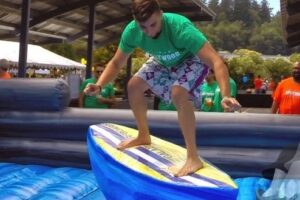For the first edition of “Ask Avi Anything”, I asked the members of the Summer Camp Professionals Facebook group to suggest some questions. (If you’re not already a member of this group, I highly recommend it. Join here.)
Keith Schoch of Lakeview Day Camp (East Brunswick, NJ) asks: How can directors make the best use of veteran staffers during camp staff training?
This question takes me back to the days when I was a Junior Counselor at Camp Hilbert in Richmond, VA. One of the most memorable sessions during staff orientation was titled “Deviating From The Norm” and was given by a counselor named David Cohen. David was, as I said, a counselor, not a head counselor or other administrator (yet). The heads of the camp had identified David as someone who was good at improvising and changing things up to ensure a great time for his campers, and asked him to give that session.
The basic steps in planning a staff training session are:
- Identify a practice in which we want our staff to excel.
- Plan a session that will effectively give participants the tools to excel in this practice.
- Give the session an intriguing title and put it in the schedule.
But by adding a few steps, we take our training to a whole new level:
- Identify a practice in which we want our staff to excel.
- Identify one or more members of our staff who exemplify what we’re hoping to instill.
- Invite these staff people to plan and deliver the session.
- Go over the session plan with them to ensure that it is consistent with the camp’s goals, and that it will effectively give participants the tools to excel in this practice.
- Give the session an intriguing title and put it in the schedule, along with the name(s) of the staff member(s) who will deliver it. In this case, the title will be even more intriguing to anyone who knows the people who are giving the session. When we saw that David Cohen would be giving a session on Deviating From The Norm, the reaction was, “Wow! He’s really good at that! This is gonna be good…”
Another approach:
- Identify a staff member who is all-around amazing, possessing traits we want our staff to emulate.
- Identify one thing that this staff member does really well and ask him/her to prepare a session on the subject.
- Go over the session plan with him/her to ensure that it is consistent with the camp’s goals, and that it will effectively give participants the tools to excel in this practice.
- Give the session an intriguing title and put it in the schedule, along with the name of the staff member who will deliver it.
In addition to the veteran staff members who are called upon to deliver or moderate sessions, others can be invited in advance to participate by role playing situations that are being discussed, or sharing their own experiences that illustrate what is being taught.
There are several benefits in utilizing veteran staff other than directors and head counselors:
- It keeps the participants engaged. No one wants to hear from the same 2 or 3 people during every training session. It’s just boring and over time the content becomes white noise, traveling in one ear and straight out the other.
- It keeps the veteran staff engaged. How often do we feel like we need to twist the arms of our veteran staff just to attend every session? By involving as many people as possible, it energizes even the most jaded experts to participate in training. Even those who are not giving sessions themselves are happy to support their colleagues and friends who have been called upon to give one.
- The training content offers a bottom-up perspective. Rather than telling staff, “This is what WE (your bosses) expect of YOU (our employees),” the tone becomes, “I am one of you, and I’m eager to share something I have learned over the years that makes my campers happier and, as a result, my job easier. It has worked well for me, and I believe it will work for you too!”
A THIRD APPROACH:
I have personally implemented all of the suggestions that I have shared in this article so far. But as I was putting my words together, a third approach occurred to me, and while I have not yet had the opportunity to try it, I believe it beats the others hands-down, and can absolutely supercharge any camp’s staff training.
Anyone who attends the ACA or similar conferences has seen the “Call for Presentations” that goes out a few months in advance, inviting participants to propose topics for sessions they can give at the conference. Why not approach staff training in the same way? A few months before staff orientation, invite the entire staff to propose subjects that they would like to present at orientation.
This approach can offer benefits that go way beyond the three I outlined above. A few that come to mind:
- It highlights areas where improvement is needed that you might not have thought of (or that you didn’t even know about at all).
- It brings to light great things that may have been going on behind the scenes in your camp, but have not yet come to your attention.
- It highlights talents or special areas of training that your staff members have, of which you were not previously aware.
A CLOSING THOUGHT:
While I believe that my suggestions are sure-fire ways to make the best use of veteran staffers during camp staff training, there’s one essential piece that can make or break the effectiveness of any of them: The director’s participation.
I have seen directors introduce a speaker, building him/her up as the best thing since bug juice, and then slip out the back door as the session begins to attend to more important things. In some cases, the director doesn’t even show up to introduce the session, trusting that the staff member “needs no introduction” and is perfectly capable of starting and running the session on his/her own.
But the message this sends to the rest of the staff is that the subject is unimportant, as if the line of thinking was, “If it was important, I’d be giving the session myself. But it’s not, so I’m not bothering to stick around.”
The simple fact is that while a training session is going on, barring an emergency that has just popped up and requires immediate attention (in which case an assistant director should be there in the director’s place, explaining that the director is dealing with an emergency situation), there is nothing more important for the director to attend to. The director has three vital jobs at every training session that he/she is not personally giving. They are:
- Introduce the session, talking about the importance of the topic and the speakers’ talents (especially his/her qualifications to address this vital subject).
- Sit down and listen attentively to the entire session, participating without appearing to try to take over or direct the session while it’s going on.
- After the session concludes, thank and praise the speaker, and mention something new that the director learned from the presentation.
Even when multiple breakout sessions are happening at once, someone representing the camp’s leadership should attend each one and act in this manner.
We always tell our staff that they need to lead their campers by example. As directors, actively participating in training sessions is an excellent way to personify the idea of leading by example.




Leave a Reply
Your email is safe with us.
You must be logged in to post a comment.